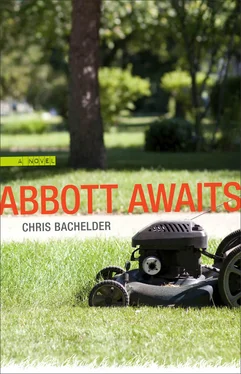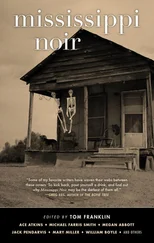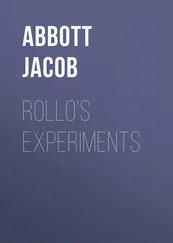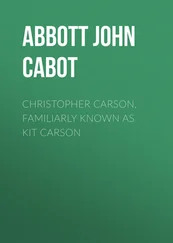It’s already hot at 8:36 when Abbott and his daughter squat down beside the runoff grate at the edge of the road in front of their house. The girl says, “Rocks.” Abbott picks up three small rocks, puts them in his palm, and extends his palm toward his daughter. His daughter pinches a rock between her thumb and forefinger, then holds it over the grate a moment before dropping it in. Abbott and his daughter listen for the sound of the rock hitting water — a faint, high-pitched bloop that reverberates in the dark tunnel. The girl laughs when she hears it. Abbott extends his palm again, and his daughter pinches a rock and drops it into the grate, laughing when the rock hits water. Abbott offers the last rock, and the girl takes it and drops it into the grate, but the rock is too small and flat to produce a sound. The girl holds still for several seconds, waiting for the noise. Then she says, “More rocks?” Abbott is uncomfortable in his squat. He has begun having pain in his right hip. He of course considers arthritis. He picks up three more rocks, puts them in his palm, and extends his palm toward his daughter. A spry, gray-haired man, either a full professor or a retired full professor, walks up to the grate and stops. “My kids used to love putting rocks in that damn grate thirty years ago,” he says to Abbott. “Every kid in this neighborhood has dropped rocks in that grate. Decades of rocks. It’s a wonder the tunnel isn’t all clogged up.” The man’s tone, a complex blend of sympathy and severity, is a unique characteristic of the region and still perplexing to Abbott, who grew up with the comforts of superficial nicety. Abbott knows not whether to feel consoled that he is part of a lineage or irritated that his hardship is so prosaic. “Have a good day,” Abbott says to the man. Abbott’s daughter says, “Man.” With her thumb and forefinger she pinches a rock out of Abbott’s extended palm, holds the rock tantalizingly above the grate, then drops it. She smiles when she hears the reverberant bloop . She says, “Bloop.” She pinches another rock from Abbott’s hand, holds it above the grate, drops it. The rock, when it hits the water, makes a faint, high-pitched sound that echoes softly in the dark tunnel. “More rocks?” the girl says. “Here’s another one,” Abbott says, extending his palm. It’s 8:39, hot. Somewhere a mower is already buzzing. Abbott comes out of his squat and sits on the road beside the grate. A neighbor drives by and waves. There are dozens, if not hundreds, of small rocks within Abbott’s reach. The girl drops the rock in the grate, smiles when she hears the noise. “More rocks?” she says. A dog barks in some backyard. A cloud covers and then uncovers the sun. Campus is distant and theoretical, like a galaxy or heaven. There is something beyond tedium. You can pass all the way through tedium and come out the other side, and this is Abbott’s gift today. He picks up a pinecone, puts it in his palm, and extends his palm toward his daughter. The girl’s eyes grow wide and she laughs. She reaches for the pinecone, says, “Pinecone.”
18 All Observation, Darwin Noted, Must Be For or Against Some View If It Is to Be of Any Service
Abbott would like to think he’s a good guy , and yet his wife is up there sobbing, and he’s down here with the superglue.
Abbott nearly swerves into a mailbox trying to read the church’s hand-lettered advertisement for a forthcoming sermon entitled TOLERANCE IS NOT THE SAME AS LOVE. There is no need for comment or response. No need, even, for thought. Abbott knows that you are supposed to envision your mind, your consciousness, as a clean and empty room, open windows on opposite walls, the wind just passing through. The wind is the world, here and gone, or perhaps only here. Abbott likes to add white fluttering curtains to give the wind form, but he soon discovers that the room of his consciousness has a curtain rod, some hardware, a cordless drill with a battery that needs to be charged. He’ll need an electrical outlet. Is the room wired? He can’t remember what the things on the ends of curtain rods are called. They have a name. The wind swirls in his room, stirring up dust. Abbott has thoughts, he can’t help it, about the hand-lettered advertisement for the sermon. One thought is that tolerance, while admittedly not identical to love, is, on an imaginary Continuum of Regard, a good deal closer to love than enriched uranium. Another thought, buried beneath the first like an earthquake survivor, is that there is in fact not one thing the same as love, including love.
20 Malaise Is for Renters
Some stories, like this one, have more than one ending. Here is the beginning: When his family moved into the house in Western Massachusetts, Abbott found an old nine-by-twelve carpet rolled against a wall in the unfinished basement. Soon after settling in, Abbott unrolled the musty but serviceable carpet on the cement floor. He then placed the cat’s litter box atop the carpet, both to create a comfortable excretory environment for the cat and to limit the dispersal of litter. During the winter, Abbott began to suspect the cat was spraying the carpet, but the carpet is dark and the basement lighting is poor, and he did not care to investigate the matter. When spring arrived with higher temperatures and higher humidity, however, the basement began to reek. And then tonight, Abbott, dizzy with the fumes, investigates the matter and realizes with a cold shudder that the carpet is soaked with cat piss that apparently never dries. Not dealing with it is no longer an option. He must put his hands on the carpet, and now. Abbott rolls the carpet (wincing at the wet cement beneath), opens the rusted metal doors of the bulkhead, and drags the sodden, cylindrical load up six wooden stairs to the backyard, then around the house to the driveway. Now is the time for thinking. The carpet is far too big to leave by the curb for the weekly garbage pickup, and also too big to place in or on his car to take to the dump. Abbott knows what must be done, and he selects from his garage a standard carpentry saw, with which he attempts to cut a strip from the carpet along the twelve-foot side. The carpet, however, has a thick border, reinforced, Abbott will come to learn, by saw-resistant wire. Thus he returns to the garage and emerges with a large pair of hedge clippers, and with some effort he manages to slice the carpet’s border. The word Abbott cannot quite remember until much later is selvage . The sun has dipped below the tops of the big trees, but the night is still quite hot, and Abbott is sweating. The windows of his house are open, and he can hear his wife tell his daughter, “No mouth.” Once he has sliced through the carpet’s border with the hedge clippers, he is able, with considerable exertion, to cut a nine-foot strip with the saw, stopping at the bottom border to use the hedge clippers again. With this combination of tools, he makes seven long cuts, creating eight strips of filthy, urinous carpet, nine feet long and roughly eighteen inches wide. This takes quite a while. The wire inside the carpet borders cuts his fingers, which are wet with piss and slimy nuggets of cat litter. He hears his wife tell his daughter, “Time for your bath.” Neighbors walk by and watch him cut carpet with a saw. It is possible, he knows, that they can smell the ammonia from the street. He does not look up, does not indicate that he is available for chitchat. Even so, they call out, “Looks like you got your hands full there,” and, “What you need is a carpet cutter.” He grunts assent, wipes his brow with his sweaty shirt. Abbott rolls each of the eight nine-foot strips into a tight, damp bundle, and he stacks the bundles in the driveway like firewood. Cord , he thinks. He hears his wife tell his daughter, “Let’s get you to bed.” He returns the hedge clippers and saw to the garage, and he sweeps up the litter and carpet fluff from the driveway. Then he takes from the garage an empty plastic garbage can and a box of heavy-duty lawn bags. He places the carpet rolls in two bags, four to a bag, and he heaves the bags into the garbage can. He tries to push the lid on, but it will not fit. That one vivid star must be Venus. Garbage pickup, Abbott remembers, is not tomorrow but the following day. He would rather the stuffed and lidless can not sit incriminatingly at the street for thirty-six hours, so he decides to drag it back into the garage. This kind of dragging will eventually wear a hole in the bottom of the can, but Abbott does not know that yet, and he is untroubled. He presses an illuminated doorbell button mounted on a two-by-four, and the garage door drops slowly like a final curtain. And this is where the story furcates like lightning, strikes ground in four places. The first ending is about Ernest Hemingway and masculinity: catching speckled trout in a cold stream, knocking them dead on a flat rock, furling them in leaves, and placing them in a shady spot until dinner. The second ending is cold and familiar, another variation of the look-behind-the-refrigerator horror of domesticity and the soul-diminishing obligations of middle-class citizenship. The third ending is a virulent eco-sci-fi scenario, involving planetary visitors in the year 2820 who find massive underground deposits of nondegraded carpet. The fourth ending is the riskiest and the most interesting. This ending makes a sincere attempt at Franklinian homily, and it goes more or less like this: Almost any task, no matter how initially abhorrent, can, if conceived with Ingenuity and executed with Industry, create feelings of Satisfaction and Pleasure.
Читать дальше












